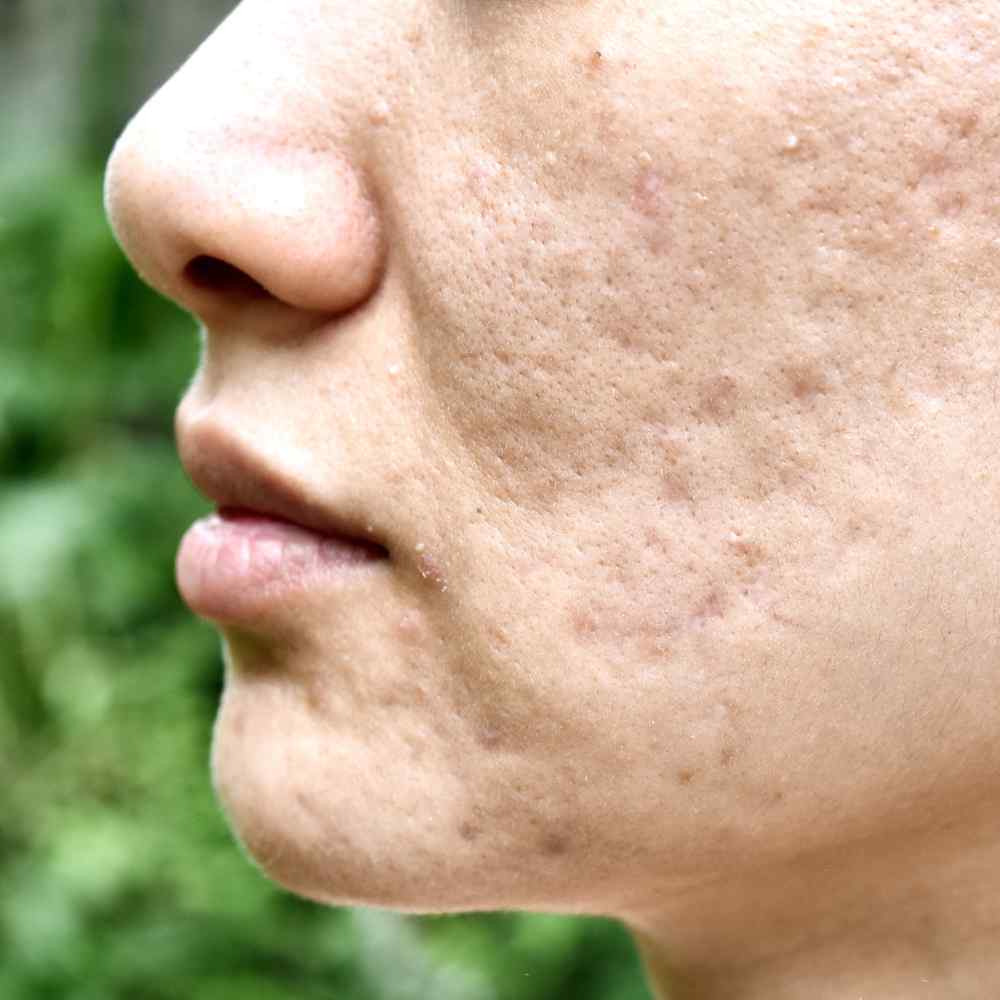
Is Vitamin C Good for Acne Scars? Here's How to Try it!
Acne scars – the persistent reminders of past breakouts that seem to linger indefinitely. It's frustrating, isn't it?
But fret not, my friend, for we are about to uncover the potential wonders of vitamin C!
Get ready for an extraordinary journey into the realm of vitamin C and its remarkable ability to bid farewell to those pesky acne reminders.
Let us delve into this topic and bid a final adieu to those stubborn scars once and for all!
About Your Acne Scars
Acne scars are basically the pits, ridges, and other skin problems that occur due to our body’s attempt to heal itself after an acne breakout.
When a pore gets clogged with dead skin cells or oil, bacteria can get trapped and cause inflammation in the follicle wall.
This prompts our body to release substances like white blood cells (the same ones that fight infection) to attack the bacteria, resulting in an inflamed sore or pimple.
As this area of skin begins healing, collagen is produced as part of the healing process which helps fill in any gaps between broken tissue.
But if too much collagen is released during this process it can lead to thickened patches of scarred tissue (which look like indentations or raised bumps on your face). Now let's talk about vitamin C for those scars!

Vitamin C & Your Skin
Before we jump into how vitamin C treats acne scars, let's explore why this nutrient is a superstar for your skin in general. Here are some of its benefits
Powerful Antioxidant
Vitamin C, known for its potent antioxidant properties, plays a crucial role in safeguarding your skin against the detrimental effects of free radicals.
These unstable molecules, notorious for accelerating the aging process and causing harm to skin cells, can render you more vulnerable to the formation of scars.
By incorporating Vitamin C into your skincare routine, you can enhance your skin's resilience and promote a healthier, more youthful complexion.
Collagen Booster
Collagen, the essential structural protein, plays a vital role in maintaining the firmness and youthful appearance of your skin. With age, the collagen production in our bodies decreases and this leads to wrinkles and fine lines.
Fortunately, vitamin C is proven to boost collagen effectively. This helps reduce the appearance of acne scars and other skin imperfections as well.
Not to mention, its antioxidant capabilities help protect your skin cells from further damage while encouraging a more radiant complexion.
By supporting collagen production, vitamin C becomes a key player in enhancing skin texture and diminishing the visibility of scars, allowing you to enjoy a smoother and more radiant complexion.
Brightening Effects
Vitamin C, a powerful antioxidant, can effectively fade pigmentation issues such as dark spots and redness commonly associated with acne scars.
By promoting collagen synthesis and inhibiting melanin production, it not only lightens the appearance of scars but also helps even out your skin tone, resulting in a more uniform complexion and reduced visibility of scars.
Incorporating Vitamin C into your skincare routine can provide you with the added benefit of a brighter and more radiant complexion.
Wound Healing
Acne scars are essentially wounds that have healed improperly. When the skin is damaged, the body's natural wound healing processes come into play.
Vitamin C, a powerful antioxidant, plays a crucial role in supporting these processes. By promoting collagen synthesis and reducing inflammation, vitamin C can help scars become less prominent over time, resulting in smoother and more even skin texture.
Incorporating vitamin C into your skincare routine may contribute to the overall improvement of acne scars and give you the confidence to embrace healthier and clearer skin.

So, Is Vitamin C Good for Acne Scars?
The short answer is yes, vitamin C can help treat acne scars that are a result of acne lesions.
But don't expect overnight miracles. It's not a magic eraser that will make scars vanish instantly. Instead, it works gradually and may help in several ways. Here are a few:
Reducing Inflammation
Vitamin C is known for its powerful anti-inflammatory properties, making it a valuable ingredient in skincare.
By soothing the skin, it has the potential to alleviate redness and irritation commonly associated with scars, promoting a healthier and more even complexion.
Incorporating vitamin C into your skincare routine can be a beneficial step towards achieving a smoother and more radiant appearance.
Lightening Dark Spots
If your acne scars are darker than your natural skin tone, incorporating vitamin C into your skincare routine can help fade the pigmentation in the scar tissue and make them less noticeable.
Vitamin C has been shown to have brightening properties that can promote a more even skin tone, reducing the appearance of acne scars over time.
By regularly using vitamin C-based products, you can enhance the overall complexion of your skin and achieve a more radiant and youthful appearance.
Boosting Collagen Production
By supporting collagen production, vitamin C can help improve the texture and plumpness of your skin, resulting in better skin health and a more youthful and radiant appearance.
This, in turn, can minimize the appearance of scars and promote a smoother complexion.
Adding topical vitamin C into your skincare routine can provide long-term benefits for your skin's health and overall appearance.

Using Vitamin C for Acne Scars: Tips & Tricks
So, how do you add vitamin C to your daily routine to improve your skin tone? To make the most of vitamin C's benefits for acne scars, follow these tips:
Choose the Right Product
When searching for vitamin c serum or cream, it's important to look for products that contain L-ascorbic acid, which is a highly effective form of vitamin C known for its numerous benefits.
This powerful ingredient helps to brighten the skin, reduce the appearance of fine lines and wrinkles, and even out skin tone.
When considering the concentration, a range of 10-20% is typically recommended as it is effective in delivering results without causing irritation or sensitivity.
So, be sure to keep an eye out for products with the right concentration of L-ascorbic acid to enhance your skincare routine!
Consistency is Key
For optimal results, make sure to consistently apply your vitamin C product every morning.
By adding this excellent addition into your morning skincare routine, you can enjoy the benefits of its antioxidant protection, which helps safeguard your skin throughout the day from environmental stressors and free radicals.
Don't miss out on the opportunity to give your skin a healthy and radiant glow!
Patch Test
Before slathering the product all over your face, it's always a good idea to perform a patch test. This simple step involves applying a small amount of the product on a small area of your skin to check for any negative reactions.
By doing so, you can ensure that the product is suitable for your skin and avoid any potential discomfort or irritation. Safety first!
Pair it with Sunscreen
Vitamin C, a powerful antioxidant, can enhance the radiance of your skin. However, it's important to note that it can also increase the skin's sensitivity to the sun's harmful rays.
To protect your skin, make sure to apply a broad-spectrum sunscreen with a minimum SPF of 30 after using Vitamin C products. This will provide an extra layer of defense against sun damage, keeping your skin healthy and youthful.
Be Patient
Vitamin C, a powerful antioxidant, takes time to demonstrate its effects on your skin tissue. Patience is key, as it may require several weeks to months of consistent usage to observe a visible improvement in the appearance of your acne scars.
However, the long-term benefits and potential to achieve a smoother complexion are worth the wait.
Consult a Dermatologist
If your acne scars are severe or not responding to at-home treatments, it's worth considering consulting a dermatologist who specializes in skincare and acne treatment.
They have the expertise to assess your specific situation and can recommend more advanced treatments tailored to your needs.
Taking the step to seek professional advice for acne vulgaris and the scars it leaves behind can provide you with additional options and guidance for addressing your acne scars effectively.
Other Treatment Options
In addition to vitamin C, there are plenty of options available for removing those marks from your face!
Firstly, lasers like fractional carbon dioxide laser resurfacing target deeper layers of your skin with tiny beams that help repair damage and activate collagen (which helps give you fresh new looking skin!).
Chemical peels use chemical solutions like alpha and beta hydroxy acids which exfoliate away damaged cells to reduce scarring. You can also exfoliate away damaged skin cells with microdermabrasion.
Injections such as hyaluronic acid and collagen fillers can also help plump up depressions in the surface of your skin where acne once was.
And microneedling is another popular technique wherein a device creates hundreds of microscopic punctuates in our topmost layer which triggers increased production of collagen and elastin for smoother looking results.
No matter what treatment option you choose though - always keep up with healthy skincare habits.
Wash your face regularly with warm water and a gentle cleanser (no harsh soaps!) moisturize daily, and wear sunscreen when exposed to sun. These little steps go a long way!
Vitamin C – A Bright Idea for Acne Scars
If acne scarring have been hindering your ability to face the world with confidence, vitamin C can be a powerful tool in your skincare kit.
With its antioxidant properties, skin brightening benefits, and collagen-building abilities, vitamin C has the potential to help you get the clear skin you’ve been longing for.
And while it won’t happen overnight – patience is key! – integrating vitamin C into your current routine should absolutely help you live that gorgeous life that’s always been just outside your reach. Now go ahead and get that healthy skin glow up!

















